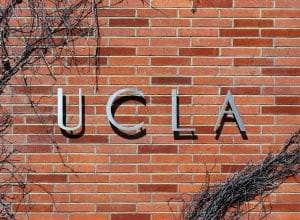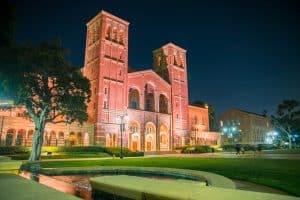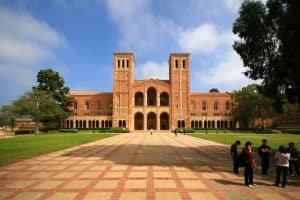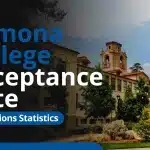UCLA has not yet published its official acceptance rate for the Class of 2029, but it did announce that it received over 145,000 applications in the latest admissions cycle. If current trends continue, the acceptance rate for the Class of 2029 will likely be similar to—or even lower than—the Class of 2028’s rate of 9%. Among the University of California schools, UCLA remains the most competitive and difficult to get into.
In this blog, we break down UCLA’s acceptance rates, including yield, transfer, and waitlist trends. We’ll explore how these numbers have changed over the years, what they mean for applicants, and share quick tips to boost your chances of getting in.
- What Is UCLA’s Acceptance Rate?
- UCLA Acceptance Rate Trends
- No Early Action and Early Decision for UCLA
- How to Get Accepted into UCLA
- UCLA Transfer Acceptance Rate
- UCLA Waitlist Acceptance Rate
- Frequently Asked Questions
- Takeaways
What Is UCLA’s Acceptance Rate?
Getting into UCLA is tough. For the Class of 2028, the acceptance rate for freshmen applicants clocked in at 9%, only a slight increase from 8.7% last year. Let’s take a closer look:
| Total First-Year Applications | Accepted | Acceptance Rate |
| 146,276 | 13,114 | 9% |
Talk about a fierce admission round. Out of 146,276 freshman applications, only 13,114 students were accepted, giving an acceptance rate of just 9%.
This was a historic year for UCLA admissions. The school received the second-highest number of applications in the past decade, with only the Class of 2026 surpassing it, which had a staggering 149,815 applicants.
It’s no secret that UCLA is hard to get into, but that’s because it’s such a well-respected school with tons of applicants every year. They’re looking for standout students who excel academically and also show a real passion for learning and a drive to make a positive difference in the world.
UCLA yield rate
For the Class of 2028, UCLA had an impressive yield rate. Among the 13,114 freshman admits, 50%—or around 6,610—eventually enrolled. A college’s yield rate is simply the percentage of students who choose to enroll after receiving an admission offer.
Over the past three years, UCLA has kept impressive yield rates: 50% of admitted students enrolled for the Class of 2028, 52% for the Class of 2027, and 50% for the Class of 2026. For context, the national average yield rate for public colleges is only 25%. These numbers show how popular UCLA is among admitted students.
As an applicant, a high yield rate means a few things for you. First, it gives less chance for waitlisted students to get a spot. Second, it shows that UCLA’s reputation makes it a top pick for most admitted students. Basically, this means your application needs to stand out in every way.
UCLA Acceptance Rate Trends
UCLA’s acceptance rates have shown some noticeable ups and downs over the years. To get a clearer picture, let’s take a look at the data from the past decade:
| UCLA Class | Total Application | Total Accepted | Acceptance Rate |
| 2028 | 146,276 | 13,114 | 9% |
| 2027 | 145,910 | 12,737 | 8.7% |
| 2026 | 149,815 | 12,844 | 8.6% |
| 2025 | 139,490 | 15,028 | 10.8% |
| 2024 | 108,877 | 15,602 | 14.3% |
| 2022 | 111,322 | 13,720 | 12.3% |
| 2021 | 113,761 | 15,970 | 14% |
| 2020 | 102,242 | 16,456 | 16.1% |
| 2019 | 97,121 | 17,474 | 18% |
| 2018 | 92,728 | 16,016 | 17.3% |
Over the past 10 years, UCLA has seen more and more applications. The peak was for the Class of 2026, with 149,815 applications. But despite the growing numbers, the acceptance rate has dropped significantly over the years, hitting its lowest for that same class.
As UCLA becomes more competitive, more and more top students from around the world are also applying, making it even harder to get in. Many applicants have near-perfect GPAs, impressive extracurriculars, and strong personal statements, which raises the bar for everyone.
Since the UC system went test-blind, SAT and ACT scores aren’t considered in admissions anymore. This change has encouraged even more high-achieving students to apply, especially those who might have held back because of lower test scores in the past.
UCLA acceptance rate vs Ivy League schools
UCLA is often mentioned alongside the Ivy League when discussing top-tier schools. With an overall 9% acceptance rate for the Class of 2028, here’s how UCLA compares to the Ivies:
| Ivy League School | Acceptance Rate (Class of 2028) |
| Harvard University | 3.6% |
| Yale University | 3.7% |
| Columbia University | 3.85% |
| Princeton University | 4.6% |
| Brown University | 5.2% |
| Dartmouth College | 5.3% |
| University of Pennsylvania | 5.4% |
| Cornell University | 8.4% |
With a 9% acceptance rate, UCLA is just as tough to get into as some Ivy League schools. It may not have the ultra-low rates of Harvard, Yale, or Columbia, but you must consider how many applications UCLA gets each year.
For the Class of 2028, UCLA had 146,276 applicants, while Harvard only received 54,008—not even half of UCLA’s total. This shows just how popular UCLA is among students looking for a top-tier college experience.
While UC schools generally have higher acceptance rates than these elite private schools, many are still considered “reach” schools—and a few even qualify as “super reach” institutions. UCLA falls into this category, consistently receiving the most first-year applications of any university in the country. Even if you’re a top student in California with a high GPA and strong extracurriculars, there’s no guarantee you’ll get in.
So why is UCLA so competitive? It’s a mix of things—its prime location in LA, constant appearances in movies and TV, smart marketing, and the cycle of perceived exclusivity. When a school’s acceptance rate drops, people see it as more prestigious, leading to more applications and an even lower admit rate. It’s a tough cycle, and UCLA is right in the middle of it.
No Early Action and Early Decision for UCLA
UCLA doesn’t offer Early Action or Early Decision for any applicants. It has always stuck to a Regular Decision process, meaning everyone is considered at the same time. This isn’t by accident—UCLA gets a massive number of applications each year, often over 100,000, and wants to give all applicants a fair and equal review.
UCLA application deadline
UCLA’s application deadline is November 30 every year. This applies to both freshmen and transfer applicants since the UC system doesn’t offer Early Action or Early Decision. Make sure to submit your application on time—late submissions won’t be accepted.
Admissions decisions come out in late March for freshmen and late April to early May for transfers. You’ll get your results through the UC Application Portal, so stay on top of your emails for any updates!
How to Get Accepted into UCLA
UCLA’s acceptance rate of 9% shows just how competitive the school is. A lower acceptance rate means you’ll need a strong application to stand out.
One thing to keep in mind is that UCLA has a test-blind policy for SAT and ACT scores. This means your test scores won’t be considered for admission or scholarships. You can still submit them, but they’ll only be used for things like course placement after you enroll or meeting minimum eligibility requirements. UCLA also does not require or accept letters of recommendation for the general application process.
Since UCLA uses a holistic admissions process, they look at your entire application, not just one piece of it. So, how can you stand out from the thousands of other applicants? Here are a few important areas to focus on:
Target GPA
UCLA has a minimum GPA requirement for applicants:
- If you’re a California resident, you need at least a 3.0 GPA to be eligible.
- If you’re applying from out of state, the requirement is a bit higher at 3.4 GPA.
But meeting the minimum doesn’t guarantee admission. In reality, UCLA is highly competitive. The average GPA of recently admitted students is 4.25, which means most students are taking advanced or honors courses and earning top grades.
A 4.25 average GPA shows just how selective UCLA is. Compared to other schools in the U.S., this puts UCLA among the toughest universities to get into. If you’re aiming for a spot, strong academics are a must!
Extracurriculars
UCLA isn’t just looking for straight-A students—it wants thinkers, creators, leaders, and changemakers. Your talents in the arts, sports, community service, or any creative or intellectual pursuit matter just as much as your GPA.
More than anything, UCLA is about energy, ideas, and diversity. Maybe you have a unique story, a fresh perspective, or a drive to innovate—whatever makes you you is what will make you stand out. The campus thrives on new voices and bold ideas, so showing how you’ll add to the mix is key.
Most importantly, be real. UCLA values curiosity, leadership, and community impact, so let your passions shine. Stay true to yourself, and show them why you belong in Bruin Nation.
Personal Insight Questions
As a first-year applicant, you’ll pick four out of eight questions to answer, with each response capped at 350 words. It’s totally up to you which ones you choose, so go with the ones that best reflect your experiences and story.
Think of UCLA as a person. If you met face-to-face, what would you want them to know about you? These questions give you the chance to share your story—your creative side, leadership experiences, challenges you’ve overcome, or anything that makes you you. No matter which questions you choose, let your personality shine, just like you would in real life.
You can check out all the questions here and start thinking about your answers!
And if you want a detailed breakdown of each requirement, check out our step-by-step guide on UCLA’s admissions process. It’s full of tips to help you create a standout application and boost your chances of getting into one of the most competitive schools in the country.
UCLA Transfer Acceptance Rate
For the Class of 2028, 27,177 transfer students applied to UCLA, and 6,177 were accepted, putting the transfer acceptance rate at 23%. That’s no surprise! UCLA has always accepted transfers at a higher rate than freshmen.
Now, let’s take a look at UCLA’s transfer acceptance rates over the years to see how the numbers have changed:
| UCLA Class | Total Application | Total Accepted | Acceptance Rate |
| 2028 | 27,177 | 6,177 | 23% |
| 2027 | 23,974 | 6,189 | 26% |
| 2026 | 24,930 | 5,961 | 24% |
| 2025 | 28,457 | 5,435 | 19% |
| 2024 | 25,957 | 6,271 | 24% |
| 2022 | 24,121 | 5,335 | 22% |
| 2021 | 23,756 | 5,575 | 23% |
| 2020 | 22,050 | 5,720 | 26% |
| 2019 | 22,287 | 5,708 | 26% |
| 2018 | 20,075 | 5,188 | 26% |
Unlike freshmen applications, which have skyrocketed over the past decade, transfer applications have grown at a steadier pace. The only big spike happened for the Class of 2025. This was right after the COVID-19 lockdown and more students applied. Despite this, UCLA’s transfer acceptance rate has stayed fairly consistent, usually falling between 20% and 26%.
You’re considered a transfer applicant if you graduated from high school and have taken college-level courses at a college or university after graduation. When reviewing transfer applications, UCLA looks at a wide range of factors to get a full picture of your academic achievements. Some things—like GPA and completed coursework—are easy to measure, while others require a more holistic review.
To be a competitive transfer applicant, you’ll need strong academic performance and solid preparation. The average GPA for admitted transfer students is above 3.5, and most have completed all or most of their major prep courses. UCLA prioritizes applicants from California community colleges and only admits transfer students for the fall quarter.
Important dates and requirements
UCLA’s transfer application deadline is November 30 each year. This applies to all transfer applicants, as UCLA only admits transfer students for the fall quarter. Make sure to submit your application on time because late applications are not accepted.
To apply as a transfer student, you need to meet these requirements by spring before you transfer:
- Junior standing. Complete 60 semester (90 quarter) transferable units
- GPA of 3.2 or higher in transferable courses
- Required coursework
- Two transferable English courses (composition or critical thinking & writing)
- One transferable math course (must require intermediate algebra or higher as a prerequisite)
- Four transferable courses from at least two of these areas:
- Arts & Humanities
- Social & Behavioral Sciences
- Physical & Biological Sciences
- Progress toward major prep courses before transferring
- Personal Insight Questions. You’ll need to answer one required question, plus three more from a list of seven. Which ones you pick is completely up to you. You can take a look at the question here and start thinking of your answers.
Lastly, the personal insight questions are all about you. UCLA’s guidance for each question is just there to help if you need it, but the main focus should be on expressing who you are, what matters to you, and what you want to share with UC.
UCLA Waitlist Acceptance Rate
UCLA has one of the lowest waitlist acceptance rates among all UC schools. Let’s take a look at the Class of 2028 data as reported by the school’s Common Data Set for Fall 2024:
| UCLA Class | Waitlisted Applicants | Accepted the Waitlist Offer | Waitlisted Students Admitted | Acceptance Rate |
| 2028 | 15,023 | 9,198 | 1211 | 8% |
UCLA had an 8% waitlist acceptance rate for the Class of 2028. Out of 15,023 students placed on the waitlist, 9,198 accepted the waitlist offer, and only 1,211 were admitted.
This marks a drop from the 12% waitlist acceptance rate for the Class of 2027. One big reason for this lower rate is UCLA’s increasing yield rate (the percentage of admitted students who enroll). In recent years, the yield rate has gone up, hitting 50% in 2024 and 52% in 2023, leaving fewer spots open for students on the waitlist.
Like many schools, UCLA uses its waitlist to manage enrollment numbers. With more admitted students accepting their offers, the school has to be cautious to avoid over-enrollment, which means fewer waitlisted students get in.
Compared to other UC schools, UCLA has one of the lowest waitlist acceptance rates. For example, UC Berkeley admitted 24% of waitlisted students for the Fall 2023 class, while UC Santa Cruz accepted 13%, and UC Davis admitted 19% in the same period. UCLA’s waitlist, by contrast, is highly selective, reflecting its competitive admissions process.
What to do if you’re waitlisted
Getting waitlisted isn’t a definite no. It’s more like a maybe. UCLA sees you as a strong applicant but doesn’t have a spot for you right now. The waitlist is their backup plan, giving them a pool of candidates to choose from if some admitted students decide not to enroll.
Here’s what you can do to stay in the game:
- Confirm your spot. Make sure you officially accept your spot on the waitlist by following UCLA’s instructions. If you skip this step, you’re out of the running.
- Write a Letter of Continued Interest (LOCI). Send a short, genuine note to UCLA’s admissions office. Reaffirm your excitement about UCLA and share any new achievements or updates since you applied.
- Keep your grades up. Stay consistent with your academics and keep participating in your extracurriculars. UCLA values commitment and strong performance, even after your application is submitted.
- Stay grounded. The waitlist process can be unpredictable. While it’s okay to hope for good news, focus on the school where you’ve been admitted to ensure you start your college journey off on the right foot.
The best way to avoid the uncertainty of the waitlist is to submit a strong application from the start. But if you do end up on the waitlist, these steps can help you stand out as a committed and qualified applicant.
Frequently Asked Questions
1. What is UCLA’s latest overall acceptance rate?
For the Class of 2028, UCLA had a 9% overall acceptance rate. Out of 146,276 freshman applications, only 13,114 were accepted.
2. What is UCLA’s transfer acceptance rate?
For the Class of 2028, 27,177 transfer students applied to UCLA, and 6,177 were admitted, resulting in a 23% acceptance rate.
3. What is UCLA’s waitlist acceptance rate?
UCLA had an 8% waitlist acceptance rate for the Class of 2028. Out of 15,023 students placed on the waitlist, 9,198 accepted the waitlist offer, and only 1,211 were admitted.
4. What is UCLA’s GPA requirement?
UCLA has a minimum GPA requirement for applicants. If you’re a California resident, you’ll need at least a 3.0 GPA to qualify. For out-of-state applicants, the bar is slightly higher at 3.4 GPA.
5. Does UCLA accept standardized test scores?
No, UCLA does not accept standardized test scores like the SAT or ACT for admissions or scholarships. The UC system is test-blind, meaning test scores are not considered when evaluating applicants. However, you can still submit them for purposes like course placement or fulfilling certain requirements after you’re admitted.
Takeaways
UCLA has been ranked the No. 1 public university in the country for the past eight years and sits at No. 15 among all national universities in the U.S. News & World Report Best Colleges rankings. With that kind of prestige comes fierce competition, making admissions tougher each year and lowering acceptance rates for hopeful Bruins.
- UCLA reported an overall acceptance rate of 9% for the Class of 2028, one of the lowest in the last ten years. This was with a yield rate of 50%.
- While UCLA’s acceptance rate is higher than that of the Ivy League’s, it stands on par with those elite schools’ prestige because of the massive number of applicants and consistently high yield rate each year.
- The transfer acceptance rate at UCLA is 23%, while the waitlist acceptance rate is 8% for the Class of 2028.
- California residents need a minimum 3.0 GPA, while non-residents must have at least a 3.4 GPA to qualify. To be truly competitive, aiming for a 4.2 GPA or higher will give you a much better chance.
- With UCLA’s highly competitive admissions, getting help from a college admissions consultant is a smart move to strengthen your application and make you stand out.

Eric Eng
About the author
Eric Eng is the Founder and CEO of AdmissionSight, graduated with a BA from Princeton University and has one of the highest track records in the industry of placing students into Ivy League schools and top 10 universities. He has been featured on the US News & World Report for his insights on college admissions.






















